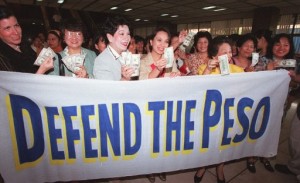Bangko Sentral net loss hits P23.6B

In this file photo, a group of Philippine businesswomen holding their US currency bills arrive at the Central Bank of the Philippines to sell their greenback as part of their campaign to boost the beleaguered local currency. The Bangko Sentral ng Pilipinas, however, did the opposite by buying dollars to help curb a steeper rise of the peso, posting a net loss of P23.6 billion as of the end of the third quarter last year. AFP PHOTO
The Bangko Sentral ng Pilipinas continued to post a net loss in the third quarter of 2011 as it engaged in heavier dollar buying to help curb a potentially steeper rise of the peso against the dollar.
Monetary officials said that under the BSP’s foreign exchange policy, the peso was being allowed to have a generally market-determined rate, but that market intervention was permitted from time to time to avoid too much volatility of the currency, which they argued was harming business and the economy.
Documents from the BSP showed that in the first three quarters of 2011, the central bank incurred a net loss of P23.62 billion. However, this was better than the P36.68-billion net loss registered in the same period of the previous year.
The net loss was attributed to significant dollar purchases by the central bank that officials said was necessary to help prevent the peso from appreciating in a sudden and sharp manner.
Total foreign exchange losses of the BSP in the first three quarters of 2011 amounted to P36.66 billion. These losses were partly offset by the central bank’s earnings from other operations. In the same period of the previous year, foreign exchange losses stood higher at P56.92 billion.
The peso was experiencing heavy appreciation pressures in the first three quarters, more so in the first half, brought by the surge in foreign portfolio investments.
The huge inflow of the “hot money” into the Philippines mirrored the experiences of emerging markets in general. Officials said emerging markets became attractive to portfolio fund owners because of the anemic performance of the developed economies.
The eurozone and the United States were both posting lackluster growth rates as they struggled to recover from the 2009 recession.
The peso, which now hovers between the 43- and 44-to-a-dollar level, strengthened to the 42:$1 territory last year on the back of robust inflow of foreign investments in Philippine bonds and stocks.
The surge in portfolio inflows, however, was suddenly reversed in the fourth quarter. This was due to dampened sentiment among investors on the global economy as resolution of the debt crisis in Europe was further delayed.
Economists said that the prolonged crisis in the West gave an unfavorable outlook on the performance even of emerging markets like the Philippines because the debt crisis in the eurozone was seen to reduce export earnings of exporting economies.
Europe is one of the biggest export markets for Philippine-made electronics and other goods from emerging Asian economies.
